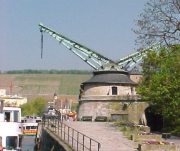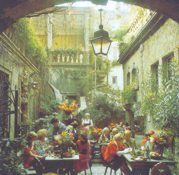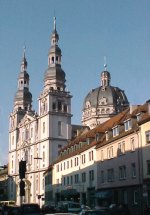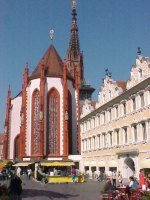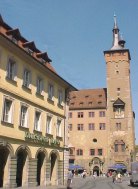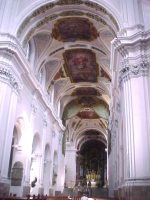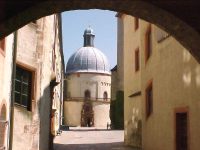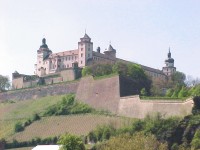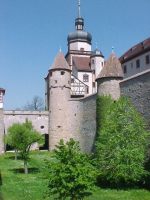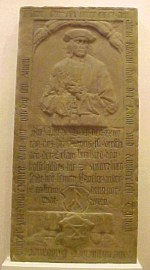
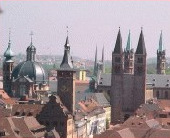
The northern most town on the Romantic Road, the Celts founded Würzburg about 650 B.C. on the place of the present day Marienberg Castle Fortress. Würzburg is the center of Germany's Franken Wine Growing Region. In addition to excellent white wine and restaurants, Würzburg offers the visitor a continual array of historic art and architecture spanning the Romanesque, Gothic, Renaissance, Baroque and Rococo periods. Its famous citizens include master sculpturer and wood craver Tilman Riemenschneider (1460-1531) Who's exquisite alters are found in several churches along the Romantic Road. Another citizen, master architect Balthasar Neumann (1687-1753) designed the Residenz Palace for Würzburg's Prince-Bishops. Today the palace is part of the UNESCO World Heritage. Würzburg's two major attractions are the Marienberg Fortress and the Residenz as well as outdoor cafes, romantic courtyard restaurants, and lovely gardens.

|
Alte KranenBuilt In 1772 By The Son Of Master Architect Baltasar Neumann,
Today The Cranes Mark The End OF The Promenade Along The River. Nearby Are An
Outdoor Cafe And A Beer Garden Both With Excellent Views Of The Fortress
Marienberg And The Historic Main River Bridge. The Adjacent Toll House Is
Nowdays Occupied By The House Of Franken Wines Which Offers 100 Franken Wines
To Sample And Buy. River Crusies And The Boat To The Baroque Gardens At
Veitshöchheim Leave From The Alter Kranen. |
|
Stachel CourtyardThe Oldest Weinhaus In Würzburg (Circa 1413) With
Beautiful Renaissance Courtyard. Have Dinner And Wine Here From The Lists Of
Franken Specialties. Open 11 AM Until 1 AM In The Evening, Sunday 11 AM - 2:30
PM. The Atmosphere Is Great. Located On
Gressengasse, One Street West Of The Marktplatz. Phone: 0931-52770. |
|
Stift HaugItalian-Baroque Church (Circa 1670). The First Major Baroque
Church In The Franken Region. A Number Of Inexpensive Wein Stubes Are Found
Near The Church Along Textorstrasse. |
|
MarktplatzThe Market Place Is Dominated By The Gothic Marienkapelle
Church (Circa 1400) And The Baroque Facade Of The Falkenhaus (Circa 1751). The
Former Home Of A Wealthy Citizen, Today The Falkenhaus Serves As A Tourist
Information Office And Library. The Church Contains Several Artistic Works Of
Tilman Riemenschneider And The Tomb Of The Great Baroque Architect Balthasar
Neumann. On The Square, Flowers, Fruit, And Cheese For Example Are Sold At
Numerous Stands. Tourist Info Open Monday-Friday 10:00-18:00, Weekends
10:00-14:00. Phone: 0931-373398. |
|
RathausThe Romanesque Tower Of The Town Hall (From Circa 1250), The
Adjacent Late Renaissance Red Building (Circa 1659), And The Baroque Fountain
Across The Street (Circa 1765) Provide A Mini Art History Lesson. Inside, The
Rathaus Is A Maze Of Restaurant And Meeting Rooms. The Red Building Houses A
Very Pleasant Courtyard Cafe Innenhof. |
|
|
Neumünster ChurchEleventh Century Romanesque Basilica Constructed Over The Stone
Coffin Of St Kilian, The Irish Missionary Murdered Here In The Year 689. The
Baroque Facade Was Added Between 1710-1716. Take The Exit From The Left Nave
To The Grave Of The Famous Medieval Minstrel Walther Von Der Vogelweide
(1170-1230) And The Lovely Lusamgärtenlein, Little Lusam Garden. |
|
|
St. Kilian DomThe Four Towered Cathedral (Circa 1050) Is One Of The Largest
Romanesque Churches In Germany. The Interior Baroque Stucco Was Added Circa
1700. Among The Numerous Tomb Stones, Prince-Bischop Scherenberg (1495) And
Lorenz Von Bibra (1519) Are The Artistic Work Of The Famous Tilman
Riemenschneider. |
|
|
ResidenzBegun In 1720, The Residenz Is The Greatest Work Of Architect
Balthasar Neumann. It Contains Over 300 Baroque And Rococo Rooms And A Gigantic
Staircase Spanned By A Curved Vault That Was The Largest Of Its Time. The
Fresco On The Vaulted Ceiling Above The Staircase Is The Greatest Work Of
Italian Artist G.B.Tiepolo And Reportedly The Largest Fresco In The World. The
Hofkirche Chapel In The South Wing Is Well Worth Seeing, You Can Get Married
There. The Hofgarten (Place Garden) Features A Restaurant, Beer Garden, And
Very Pleasant Park. Residenz: Open Every Day Except Monday, 9 AM-5 PM (10 AM-4
PM Nov.-Mar.), Entrance 7 DM, Phone 0931-3551712. Hofkirche: Open Every
Day Except Monday, 9 AM-Noon And 1 PM-5 PM (4 PM Nov.- Mar.), Entrance Free.
Hofgarten: Open Until The Beer Garden Closes - About 11 PM. Entrance Free. |
|
|
Alte MainbrückeThe Old Bridge Over The Main River Was Built Between 1473-1543
On The Foundation Of An Older, Eighth Century Romanesque Bridge. The Dozen
Large, Stone, Baroque Figures Were Added In 1730. |
|
|
|
Marienberg FortressHigh On A Hill Overlooking The Town, The Marianberg Fortress Is
Built On The Site Of The First Church In Germany Which Was Named After The
Mother Of God (Circa 706). Today, The Oldest Part Of The Fortress Is The Blue
Domed, Eleventh Century Marienkirche Church. The Prince-Bishops (The Bishops Of
Würzburg Were Also Dukes Of The Franken Region) Began The Fortifications
Circa 1200 And Improved Them Continuously Until Circa 1719 When They Began
Their New Home Across The River, The Residenz. Most Of The Baroque Features
Including The 100 Meter Deep Well And The Garden Date From 1631. The
Mainfränkische Museum Has A Good Collection Of Sculpture And Cravings From
Tilman Riemenschneider. It Also Has His Grave Stone, Died 1531. The
Museum's Nice Collections Of Baroque Furniture, Including Baroque Garden
Furniture And Numerous Wine Presses And Equipment Are Explained In English. The
Fuerstenbaumuseum Has Two Very Large, Complete 3-D Scale Models Of The Town,
One Of The Medieval Town And The Other Of The Town The Day After It Was
Destroyed By Allied Bombs In 1945. The Fortress Restaurant Comes Complete With
Outdoor Terraces And Great Views But You May Prefer To Sit Among The Trees In
The Nearby Beer Garden. The Entire Hill Is A Park With Numerous Out-Of-The-Way
Places For A Picnic Or A Nap. You Can Walk To The Top Via The Direct Route,
Passing Through A Lovely Portal Or Take The Winding Trail Trough The Vineyards.
Museums Open Every Day But Monday 10 AM To 5 PM (10 AM - 4 PM Nov.-Mar.). |
